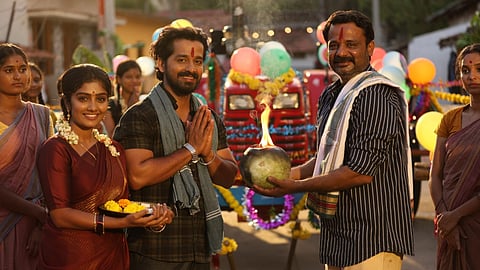Kothalavadi Movie Review: A rural fable burdened by its subplots
Kothalavadi (3 / 5)
Kothalavadi Movie Review:
When the earth beneath your feet becomes your last resort, even the most grounded men begin to slip. This could well be the crux of Kothalavadi, a film that plants its feet firmly in the soil of the rural scape, where crop failures, debt cycles, and the illusion of power coalesce into a story of slow-burning moral collapse. Director Sriraj, for the most part, succeeds in building this world — a space where survival overrides everything, even conscience.
Set in the fictional riverside village of Kothalavadi, nestled along the banks of the river Cauvery, the film opens with a conversation between two police officers — Parashuram (Rajesh Nataranga) and his superior (Avinash) — about this place that has become synonymous with quiet desperation. The villagers are drowning in debt, their lands mortgaged to a moneylender Lagori Kumara (Chethan Gandarva), who smiles with menace and lends with claws. With each failed harvest, hope recedes like the river during drought, leaving behind cracked fields and crushed spirits.
Into this fragile ecosystem enters Gujari Babu (Gopal Krishna Deshpande), a scrap trader who sells the villagers a dream disguised as revolution. He tells that the sand from their river belongs to them, not the government. With debts mounting and harvests disappointing year after year, the villagers — already beholden to Lagori Kumara — begin to see sand mining as salvation. And so begins the slow, collective slide into moral compromise.
Director: Sri Raj
Cast: Pruthvi Ambaar, Kavya Shaiva, Gopal Krishna Deshpande, Rajesh Natranga, Avinash, Bala Rajawadi, Manasi Sudhir, and Chethan Gandharva
The setup is evocative, but also strangely familiar. Over the years, several films across languages have tapped into the “village vs system” narrative. From the local strongman to the idealist-turned-criminal, from the apathetic cop to the opportunistic neta, we’ve seen these arcs before. Kothalavadi doesn’t deny this lineage; in fact, it leans into it. What it offers, however, is a slightly more meditative take that spends more time on inner conflicts than grand gestures.
At the centre of this story is Mohana (Pruthvi Ambaar), a daily wage worker and orphan whose dreams of building a modest life with Anganwadi teacher Manji (Kavya Shaiva) are pulled into the whirlpool of illegal sand mining. Mohana is not a traditional hero; he’s someone who stumbles into heroism reluctantly, his fists following his failure to find answers. Pruthvi, in his first action-heavy role, handles the physicality well, but it’s in his quieter scenes — especially those tinged with helplessness — that he truly pulls it off. Otherwise, his fights sometimes become overly dramatic.
Kavya Shaiva, in her silver screen debut, brings a quiet intensity to Manji. There’s a haunting sense of a tragic past, but it never fully surfaces. Still, she lends emotional weight to scenes that would otherwise be functional. The real show-stealer is Gopal Krishna Deshpande. As Gujari Babu, he is all charm and chill menace. He doesn't raise his voice or brandish weapons; instead, he manipulates with pauses and smiles, weaponising belief in the guise of empowerment. It’s a performance rooted in restraint, and it anchors much of the film’s tension.
The supporting cast also pitches in ably. Rajesh Nataranga’s IPS officer Parashuram, Bala Rajwadi’s Inspector Balraj, and a brief cameo by Avinash serve as foils to the village’s descent. They are men bound by duty, but all too aware of the futility of logic in the face of desperation. Manasi Sudhir, as political aspirant Malini, makes an impression, though her dialect feels slightly misplaced.
The screenplay’s biggest strength, its ambition, is also its undoing. By trying to juggle too many threads — economic collapse, environmental exploitation, electoral politics, emotional drama — the film occasionally loses grip on its central conflict. The second half, especially, suffers from narrative drift. A few subplots are introduced only to be abandoned or resolved hastily. Logical gaps, such as how a man who assaults law enforcement never gets arrested, poke through the otherwise grounded tone.
Technically, the film holds up. Karthik’s cinematography captures the textures of Kothalavadi’s soil and soul, while the background score by Abhinandan Kashyap lends a little weight even when the songs don’t. The action, though stylised, doesn’t always stay believable; a bike-to-punch stunt, in particular, breaks immersion.
Raghu Niduvalli’s dialogues elevate several scenes, offering weight to moral dilemmas. These lines, more than the plot, carry the film’s emotional and ideological punch.
The film also marks the ambitious debut of Pushpa Arunkumar as producer. She brings a certain polish to Kothalavadi, with production values that enhance its rooted storytelling without ever overshadowing it.
However, Kothalavadi doesn’t reinvent the wheel, but it does inspect its cracks. It looks at a worn-out system through a new lens. It doesn't glorify rebellion or villainy, but questions what makes either possible. In its quieter moments, the film stares unflinchingly at human frailty, asking what happens when people, already cornered, are nudged over the edge by hope itself.

